 24 citations,
January 2010 in “Annales d'endocrinologie”
24 citations,
January 2010 in “Annales d'endocrinologie” For women with moderate to severe unwanted hair growth or acne, birth control pills are the first choice, with other medications like cyproterone, spironolactone, flutamide, or finasteride as alternatives, and permanent hair removal should be done with electrolysis or laser.
 88 citations,
February 2008 in “Journal of Medicinal Chemistry”
88 citations,
February 2008 in “Journal of Medicinal Chemistry” Scientists made the first metal-based compounds from a nonsteroidal antiandrogen drug, which showed potential in fighting both hormone-dependent and independent prostate cancer cells.
 August 2018 in “bioRxiv (Cold Spring Harbor Laboratory)”
August 2018 in “bioRxiv (Cold Spring Harbor Laboratory)” Existing drugs, including a blood pressure medication, show promise as new treatments for influenza.
23 citations,
September 1992 in “Archives of Dermatological Research” Cepharanthine and minoxidil promote cell growth and delay hair cell maturation.
5 citations,
February 2021 in “Gels” HYDRO DELUXE BIO hyaluronic acid hydrogel is compatible with skin cells, may reduce inflammation, promote blood vessel growth, and protect against oxidative stress, suggesting it could help revitalize hair follicles.
11 citations,
April 2022 in “Biophysical Journal” Disulfide bonds in keratin fibers break more easily under stress, especially when wet, affecting fiber strength.
 5 citations,
October 2021 in “BioMed Research International”
5 citations,
October 2021 in “BioMed Research International” Noncrosslinked hyaluronic acid helps human hair cells grow and could be a potential hair loss treatment.
1 citations,
January 2020 in “Journal of Feline Medicine and Surgery Open Reports” Ciclosporin A effectively treated a cat's severe skin condition.
 192 citations,
March 1998 in “British Journal of Dermatology”
192 citations,
March 1998 in “British Journal of Dermatology” Minoxidil boosts growth factor in hair cells, potentially promoting hair growth.
 74 citations,
October 1998 in “Journal of biological chemistry/The Journal of biological chemistry”
74 citations,
October 1998 in “Journal of biological chemistry/The Journal of biological chemistry” The 190-kbp domain contains all human type I hair keratin genes, showing their organization and evolution.
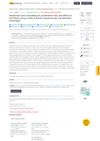
Hyaluronic acid in shampoo penetrated hair well, reduced frizz, and improved hair strength and moisture.
 55 citations,
March 2015 in “Carcinogenesis”
55 citations,
March 2015 in “Carcinogenesis” WNT10A helps esophageal cancer cells spread and keep renewing themselves.
 117 citations,
March 2017 in “Nature Communications”
117 citations,
March 2017 in “Nature Communications” Macrophages help regrow hair by activating stem cells using AKT/β-catenin and TNF.
274 citations,
June 2011 in “Science” Proteins with added sugars are crucial for plant root hair growth.
 27 citations,
August 1999 in “Urology”
27 citations,
August 1999 in “Urology” Finasteride improves urinary function in men for 2 years.
 9 citations,
January 2018 in “Acta Clinica Croatica”
9 citations,
January 2018 in “Acta Clinica Croatica” Bendamustine, often combined with other drugs, is effective and less toxic for certain blood cancers, but less effective for young, fit patients with CLL.
 96 citations,
April 2007 in “Journal of Investigative Dermatology”
96 citations,
April 2007 in “Journal of Investigative Dermatology” Grafted rodent and human cells can regenerate hair follicles, but efficiency decreases with age.
 46 citations,
August 2003 in “The journal of investigative dermatology/Journal of investigative dermatology”
46 citations,
August 2003 in “The journal of investigative dermatology/Journal of investigative dermatology” Phosphatidic acid may help hair grow by affecting cell growth pathways.
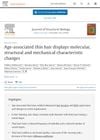 2 citations,
October 2022 in “Journal of structural biology”
2 citations,
October 2022 in “Journal of structural biology” Older thin hair is not just thinner but also has different shape, structure, and stiffness.
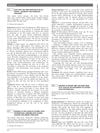 1 citations,
March 2020 in “Poster presentations”
1 citations,
March 2020 in “Poster presentations” SLE patients need careful diagnosis to distinguish infections from disease flares for proper treatment.
 47 citations,
June 2012 in “Genes & Development”
47 citations,
June 2012 in “Genes & Development” A mother's western diet can make her milk toxic, causing inflammation and hair loss in babies.
 5 citations,
June 2020 in “Experimental dermatology”
5 citations,
June 2020 in “Experimental dermatology” Redheaded people may have evolved to efficiently make vitamin D in areas with less sunlight.
 50 citations,
January 2018 in “Acta physiologica”
50 citations,
January 2018 in “Acta physiologica” Working night shifts for four days can lower the body's ability to use insulin, which may increase the risk of type 2 diabetes.
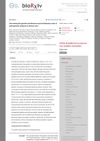 January 2024 in “bioRxiv (Cold Spring Harbor Laboratory)”
January 2024 in “bioRxiv (Cold Spring Harbor Laboratory)” The research found that genetic factors for male pattern baldness in African men differ significantly from those in Europeans.
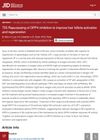 July 2022 in “Journal of Investigative Dermatology”
July 2022 in “Journal of Investigative Dermatology” Blocking DPP4 can help activate hair growth and improve hair regeneration.
 7 citations,
September 2020 in “Frontiers in Cell and Developmental Biology”
7 citations,
September 2020 in “Frontiers in Cell and Developmental Biology” IL-36α helps grow new hair follicles and speeds up wound healing.
 4 citations,
January 2014 in “International Journal of Trichology”
4 citations,
January 2014 in “International Journal of Trichology” A 12-year-old boy with a rare genetic condition has progressive hair loss with no effective treatment.
3 citations,
December 2021 in “Proteins” Wool fiber curliness is linked to the presence of certain proteins and K38.
 May 2014 in “JAMA Dermatology”
May 2014 in “JAMA Dermatology” Mother and son diagnosed with a rare genetic hair loss condition with no effective treatment.
2 citations,
August 2022 in “Viruses” Skin cancer often starts from Lgr5+ progenitor cells.






















